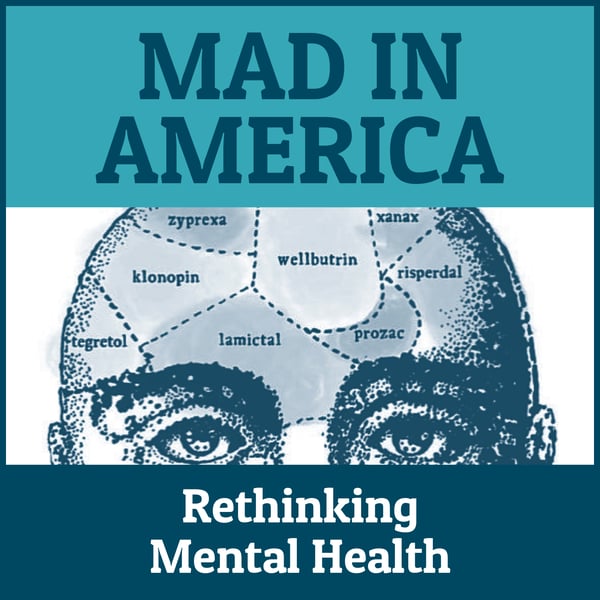One Person's Journey from Medical Model Advocate to Skeptic: An Interview with Rose Cartwright
Mad in America: Rethinking Mental Health
Mad in America
4.8 • 201 Ratings
🗓️ 6 November 2024
⏱️ 40 minutes
🧾️ Download transcript
Summary
Rose Cartwright is a screenwriter and the author of Pure, a hugely successful memoir which was then turned into a series for Channel Four. She is also a writer and producer on Netflix’s 3 Body Problem. Pure portrayed Rose’s autobiographical account of finding that she had OCD, a “mental illness”, and the breakthrough that this medical framework provided her. This was short-lived. In her new book The Maps We Carry, she writes about the dawning realization that the “illness” story she had believed in and publicly advocated for, was wretchedly incomplete and often dangerous.
In this interview, Cartwright charts her journey of painful and lonely disillusionment with the “mental illness” framework. She talks about understanding the place of her own childhood trauma and also the limitations of simplistic trauma narratives. She speaks about the place of psychedelics and meditation in helping her uncover her disconnection, eventually to realize the importance of trusting relationships and communities. In this brutally honest book and interview, Cartwright reflects on the importance of holding all our understandings around mental health and suffering, lightly.
***
Thank you for being with us to listen to the podcast and read our articles this year. MIA is funded entirely by reader donations. If you value MIA, please help us continue to survive and grow. https://www.madinamerica.com/donate/
To find the Mad in America podcast on your preferred podcast player, click here: https://pod.link/1212789850
© Mad in America 2024. Produced by James Moore https://www.jmaudio.org
Transcript
Click on a timestamp to play from that location
| 0:00.0 | Welcome to the Madden America podcast, your source for science, psychiatry, and social justice. |
| 0:11.0 | Hello everyone and welcome to Madden America. On MIA today, we published an article where a group of scholars are advocating that we must look at psychedelics through a humanity's approach instead of a medicalized one. |
| 0:26.6 | This ties in perfectly with the conversation we will have, because in the spotlight today we have Rose Cartwright, author of Pure, a hugely successful book, which was then turned into a series. |
| 0:38.3 | I encountered Rose's work through a recent Guardian article that was titled, |
| 0:42.9 | I was the poster girl for OCD, then I began to question everything had been told about |
| 0:47.8 | mental illness. And it caught my attention immediately for its very personal and nuanced |
| 0:54.0 | look into OCD and diagnosis and psychedelics, trauma, |
| 0:58.7 | and most importantly, relationality. All of that is what we will discuss today. Rose, welcome to |
| 1:04.9 | Mad at America. Hi, IOD. Thank you for having me. I'm very excited to be here. |
| 1:10.1 | You wrote Pure, which was about your experience with intrusive thoughts, right? for having me. I'm very excited to be here. You wrote Pure, which was about your |
| 1:12.3 | experience with intrusive thoughts. OCD was the diagnosis that you received. Then it was |
| 1:17.5 | turned into a series for Channel 4. And at one point, you were a huge advocate for, you know, |
| 1:22.7 | the medical model of understanding human suffering because it made sense. But since then, |
| 1:26.9 | things shifted. And you |
| 1:28.0 | write that you were confronted with information and experiences that challenged this understanding. |
| 1:34.7 | First, could you tell us briefly about your struggle with intrusive thoughts? |
| 1:38.8 | When I was around 15 years old, I started experiencing very vivid, graphic, intrusive thoughts of a sexual and |
| 1:47.3 | violent and harm-related nature. And these intrusions, it was language, it was mental images. |
| 1:56.8 | They started coming into my mind almost non-stop hundreds of times a day and they were |
| 2:04.0 | profoundly terrifying to me and profoundly shameful. You know, I was a I was a teenager. I, the content was |
| 2:13.1 | deeply disturbing to me and I didn't tell anybody about it because I was so ashamed. This |
| 2:20.5 | continued for several years into my late adolescence and into my 20s and there were other |
... |
Please login to see the full transcript.
Disclaimer: The podcast and artwork embedded on this page are from Mad in America, and are the property of its owner and not affiliated with or endorsed by Tapesearch.
Generated transcripts are the property of Mad in America and are distributed freely under the Fair Use doctrine. Transcripts generated by Tapesearch are not guaranteed to be accurate.
Copyright © Tapesearch 2025.

